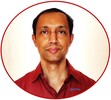Deepak G. Pawar's Blog, page 9
April 3, 2018
Blogadda.com blog submitted details
Published on April 03, 2018 08:17
April 1, 2018
Introduction to YouTube channel
Dear readers,
Here's your chance to become viewers, as I start my vlogs on YouTube.
The purpose and the function of this channel is explained in the Introductory video:
https://www.youtube.com/watch?v=M-ASIaH90eo
Please like/subscribe/share/comment.
Please continue reading/viewing.
Thank you all!
Here's your chance to become viewers, as I start my vlogs on YouTube.
The purpose and the function of this channel is explained in the Introductory video:
https://www.youtube.com/watch?v=M-ASIaH90eo
Please like/subscribe/share/comment.
Please continue reading/viewing.
Thank you all!
Published on April 01, 2018 01:55
March 30, 2018
Book release: Lake Amidst The Seas
Dear readers, the paperback and Kindle versions of #LakeAmidstTheSeas are released in India, US, UK, and elsewhere.
This work is a result of coming together of several individuals, ideas, case stories, and messages at the right time.
This work is not about any one individual; neither the chief protagonist nor me the writer – we are merely conduits for conveying the message to you the reader.
The main intention of putting this work out in the public domain is to disseminate its message of bravely standing up to arduous circumstances and growing through the ordeal to emerge stronger. Cultivating resilience is a necessity with a universal relevance in today’s stressful existence.
To encourage wide readership have tried our best to keep the cost to you the reader minimal (around Rs 200 including shipping charges of Indian paperback version, and Rs 100 of Indian Kindle version).
Therefore, it is my fervent appeal that you buy the book, read it, and send me your valuable opinions/constructive criticisms/recommendations. Please find the links below:
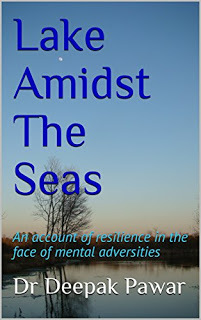
Kindle: https://www.amazon.in/dp/B07B77GX61
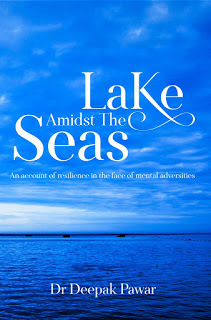
India paperback: https://store.self-publish.in/collections/latest-books/products/lake-amidst-the-seas
Other versions:
US paperback: https://www.amazon.com/dp/1980462038
UK paperback: https://www.amazon.co.uk/dp/1980462038
Thank you all!
Published on March 30, 2018 00:41
March 27, 2018
The scion and the bootlickers
A few days ago, an acquaintance of mine who had met the scion in person during a college event posted on FB as follows: 'The scion is not as dumb as the media are making him out to be. It is all due to halo and horn effects (the influence created in one area affecting our opinions in other areas).'
Sorry, beg to differ... Regardless of whether the scion has holes or rods stuck on his head, the fact remains that he does not deserve the position that he is occupying today.
He is only there because he happens to be somebody's son, since he belongs to a certain family, since his family has usurped the Mahatma's surname with no genealogical basis for it. I have previously written about he wrongness of nepotism.

Be that as it may, what about the part-members, that is the lesser mortals who do not belong to the dynasty, or the bootlickers as one might address them...
If you think about it rationally, you will realise it is beyond the pale...
Even though the national elections are a year away, the party members have declared that nothing and nobody can stop the scion from becoming the prime minister.
As though prime ministership is his father's ancestral property that needs to be handed down to the scion like a piece of family furniture.
The last time I checked, we still lived in a democratic setup. We don't want dynasties, or just plain nasties that the members of the grand-old-party have now become.
Here's the thing about the party: there is nothing grand about it anymore; it is old, but also well on its way to becoming defunct.
The only function of the party appears to be to foil the plans of the ruling government of the day, disrupt parliamentary proceedings, employ Machiavellian tactics to undermine honest efforts of the existing prime minister, put the scion and his mother on a high pedestal, and try their damnedest best to make sure the undeserving scion somehow assumes the office of prime minister one day.
It appears that they would go to any unscrupulous extent to make sure that the manga (monkey) gets the manikya (gem).
How in the whole wide world, erudite, intellectual men and women members of the party tow this dynastic line and pander to the needs of the scion and his mother, is beyond imagination. This, I am afraid, makes them nothing more than dynastic bootlickers.
It is time to act. It is time for us, we the people, to decide what sort of government should decide on the affairs of the country. A hardworking, honest team of ministers elected by the people of the country based on their abilities, or a party that wants to enshrine one family name, and would go to any extent to make sure that the dynasty continues to hog the national limelight.
Unless of course, we are saying that we would like to live in Great Britain type of aristocratic setup, wherein the queen is the head of the state, and one has to swear allegiance to her to remain a citizen of the country.
Sorry, I don't know about you, but I have a problem swearing allegiance to any one individual in the place of the country, no matter who that individual is. We are headed for a similar fate if we do not root out this dynasty.
As for the ordinary, non-political people who find faults with the existing prime minister for no reason, they seem to be motivated by certain ulterior reasons. Perhaps they have something to gain by keeping the dynasty at the helm. Or, there are likely religious reasons for the hatred that they possess towards an honest, hardworking prime minister who is trying so hard to bring about positive changes in the society.
In the interests of Truth, Dharma, and the Nation, it is time that we threw out the party, its bootlicking members, and most of all the pseudo-surname holders: the good-for-nothing, dumb-as-doorknob scion and his mother once and for all from the political scene of the country.
Sorry, beg to differ... Regardless of whether the scion has holes or rods stuck on his head, the fact remains that he does not deserve the position that he is occupying today.
He is only there because he happens to be somebody's son, since he belongs to a certain family, since his family has usurped the Mahatma's surname with no genealogical basis for it. I have previously written about he wrongness of nepotism.

Be that as it may, what about the part-members, that is the lesser mortals who do not belong to the dynasty, or the bootlickers as one might address them...
If you think about it rationally, you will realise it is beyond the pale...
Even though the national elections are a year away, the party members have declared that nothing and nobody can stop the scion from becoming the prime minister.
As though prime ministership is his father's ancestral property that needs to be handed down to the scion like a piece of family furniture.
The last time I checked, we still lived in a democratic setup. We don't want dynasties, or just plain nasties that the members of the grand-old-party have now become.
Here's the thing about the party: there is nothing grand about it anymore; it is old, but also well on its way to becoming defunct.
The only function of the party appears to be to foil the plans of the ruling government of the day, disrupt parliamentary proceedings, employ Machiavellian tactics to undermine honest efforts of the existing prime minister, put the scion and his mother on a high pedestal, and try their damnedest best to make sure the undeserving scion somehow assumes the office of prime minister one day.
It appears that they would go to any unscrupulous extent to make sure that the manga (monkey) gets the manikya (gem).
How in the whole wide world, erudite, intellectual men and women members of the party tow this dynastic line and pander to the needs of the scion and his mother, is beyond imagination. This, I am afraid, makes them nothing more than dynastic bootlickers.
It is time to act. It is time for us, we the people, to decide what sort of government should decide on the affairs of the country. A hardworking, honest team of ministers elected by the people of the country based on their abilities, or a party that wants to enshrine one family name, and would go to any extent to make sure that the dynasty continues to hog the national limelight.
Unless of course, we are saying that we would like to live in Great Britain type of aristocratic setup, wherein the queen is the head of the state, and one has to swear allegiance to her to remain a citizen of the country.
Sorry, I don't know about you, but I have a problem swearing allegiance to any one individual in the place of the country, no matter who that individual is. We are headed for a similar fate if we do not root out this dynasty.
As for the ordinary, non-political people who find faults with the existing prime minister for no reason, they seem to be motivated by certain ulterior reasons. Perhaps they have something to gain by keeping the dynasty at the helm. Or, there are likely religious reasons for the hatred that they possess towards an honest, hardworking prime minister who is trying so hard to bring about positive changes in the society.
In the interests of Truth, Dharma, and the Nation, it is time that we threw out the party, its bootlicking members, and most of all the pseudo-surname holders: the good-for-nothing, dumb-as-doorknob scion and his mother once and for all from the political scene of the country.
Published on March 27, 2018 06:46
March 3, 2018
January 26, 2018
69th Republic Day: Wishlist for the Nation
26th January 2018.
It is that day of the year when we gather to witness the Nation's military and cultural razzmatazz. The only time of the year when we get to see some discipline on display!
When I am asked what I would be doing on the 26th, I nonchalantly say 'watch the parade.' Others generally laugh at the answer, as though I am being facetious.
They probably expect me to say that I would be doing something worthier instead, like visiting overcrowded malls. No people, I mean it. I do watch the parade. If that's odd, so be it.
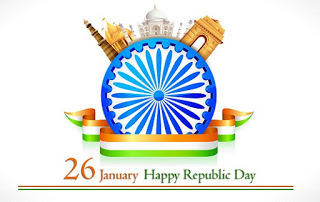
This year's observations:
1. Touching moment when the President shed tears after presenting the Ashoka Chakra posthumously to the deceased soldier's wife and mother. Never seen this happen before.
2. The same President in high spirits; laughing and cheering towards the end of the parade when the BSF women's contingent did the acrobatics on motorbikes. Extremes of emotions!
3. The best tableaux (IMHO): Maharashtra with Chatrapati Shivaji Maharaj, followed by Assam with its depiction of masks - Ravana and other characters of Ramayana.
4. Unique tableau by Karnataka: only animated animal models; no people on it (P.S.: the baboons rocked!).
5. Not one, not two, but TEN chief guests! The Singapore PM was right next to PM Modi, and was probably taken aback by the discipline on display!
6. Mesmerizing effect when the overhead camera showed the cadets marching away with robotic precision.
7. But the highlight this year had to be the BSF women's daredevilry on motorbikes; another first this year!
All these are fine. But I do not want the discipline, decorum and bonhomie to be confined to the annual jamboree. I want good things to happen in our Nation 365 days of the year.
So here's a wishlist of things that I would like to see happen for the collective good of the country and humanity in general:
1. Population level to come down. There are one too many of us! This, IMHO is the most urgent need of the country, because every other civic problem, arguably, is related to this one factor.
2. Poverty eradicated! Poverty, quite simply, is unacceptable. Economic prosperity to reach all individuals, even the poorest of the poor; no more rich/poor divide. There should not be a single homeless person on the streets, or for that matter, any stray animal on the roads. And I don't just mean cows; all animals to have shelters in all towns and cities of India.
3. Everybody obeys traffic rules. No wheelies, no jumping red signals, no driving on the wrong side of the road, no jaywalking! Discipline on the roads, people!
4. No reservations! Only merit based admission or employment; not based on caste/religion.
5. No dynastic politics or nepotism of any kind. No place for such phenomena in any public service institutions of a democracy.
6. Terrorism rooted out! No safe havens; no closing the door after the horse has bolted. Constant vigilance and prevention of attacks rather than chasing terrorists after the attacks.
7. Speedier justice for all - because justice delayed is justice denied. No influence by the rich and famous; more errant politicians/celebrities brought to justice.
8. Common education curriculum for the whole country across all levels: primary & secondary schools; and professional colleges, including engineering and medicine. No divisions such as state, ICSE, CBSE, etc. Career guidance counselling and aptitude test for all students before they embark on professional courses. Dharma/ethics/culture to be the basis for formative education; not blind western fact based bookish education. And yes, no capitation fees! Parents not to be reduced to beggars to admit their children to schools. RTE to be fully implemented. Government schools upgraded to match city schools.
9. Health for all. And health coverage and/or insurance for all. Custodians of healthcare delivery to have better life.
10. More care, concern and efforts to upkeep all natural habitats and national monuments; such as our rivers, pilgrimage centres, historic buildings, architecture, arts & crafts, scriptures, forests, flora & fauna, tribes, and indigenous cultures.
11. No conversions! No place for bigoted, narrow-minded interpretations of religious scriptures that lead to enticement/coercion to lead the gullible away from their culture/heritage/faith. Likewise foreign residents/illegal immigrants overstaying their welcome and/or creating law & order problems to be deported back to their countries.
12. India, primarily, is a spiritual place. Sanatana Dharma to show the way for spiritual oneness; full realization of the potential that is inherent in sanatanic statements such as: vasudhaiva kutumbakam; ekam sat vipra bahu vadanti, and sarve janaha sukhinobhavantu. Divisionists and secessionists to be rooted out!
Wishful thinking, do I hear you say? Maybe.
I am well aware that these are complex, complicated and multifarious issues subject to the vagaries of multiple variables.
But wishing, thinking and doing are the only things that are under my willful control. And the wise say that there is a lot of power in thoughts and words. So I will wish away!
The above list is by no means complete, but I feel these are the most pressing needs of the Nation if it has to progress and really achieve its immense potential.
Here's hoping that the governments and we the people work towards realising this potential.
Kale varshatu parjanyahaPruthavi sashya shalinimDeshoyam kshobha rahitamSajjana santu nirbhayaha!
Image source: https://4.bp.blogspot.com/-hgNapVIkQP...
Published on January 26, 2018 00:55
December 28, 2017
Book conversations: The Nanologues
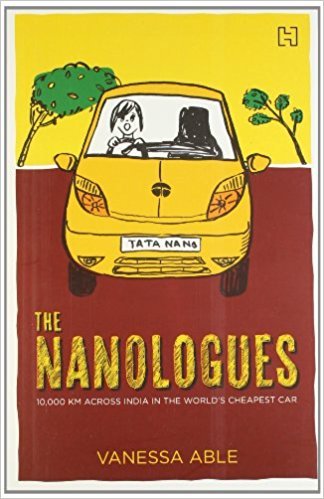
The Nanologues
Vanessa Able
Hachette India, 2013
If I were to tell you that somebody bought a Tata Nano car... you are likely to react by saying,
Why!! Of all the things...
If I were to add that that somebody went on a round-trip of India in the Nano...
Whaaaat!! No way...!
And if I were to add that that somebody happens to be a woman...
Gettouttaa here...!
And... this gets better... that somebody is a British woman; a foreigner who has no driving experience in India...
Aaaaargh!!! [while jumping up and down in disbelief and banging your head against the wall...]
That's just what this is about: a single white woman on a trek around India in a Tata Nano car, and somehow completing the journey to tell her tale.
In this engaging account, Vanessa Able combines statistics, politics, culture, lack of road etiquette/discipline/decorum/courtesy that is all too familiar an Indian trait, and of course, the experience of driving a Nano which is symbolic of India's economic rise.
Or at least it was, when it was first launched. It has since lost its place in the arch-lights in the wake of other brand innovations.
To be fair to Nano, this review is four years too late. In this period, the leading car maker, Maruti has come up with its own technological marvel that is holding sway currently: Maruti Celerio - the gearless wonder, which I happen to drive currently. And I can vouch for the ease of driving experience of the Celerio (but not the lofty fuel efficiency that the company claimed at the time of its launch).
The AMT gear technology of Celerio has caught on so well that Maruti has forced other companies to include this in their own models. Tata Nano recently has followed suit recently. Also, Nano is no longer available as the Rs-one-lakh car; all of its variants are now priced above two lakhs.
This book is also about driving, and the exasperating experience that driving is in India. In a reverse of Able's experience, I have driven for eight years in various parts of the UK during my days in the NHS - sometimes up to 100 miles in a day - and I can fully empathise with her predicament.
The difference in driving experience in between the two countries is the same that exists between chalk and cheese. Don't even try to understand the absence of any road-virtue in our culture, although I did make an attempt to address this issue in Angst.
Able's love for the Nano is evident throughout the book, whom she personifies by naming 'her'. This is essentially a road-book, akin to a road-movie; if that's the genre that appeals to you, then this is right up your street...!
I hate driving on our roads... but it is really awe-inspiring that somebody 'enterprising in a good way' such as Able has taken the bull by its horn and survived - if you leave out a few bumps and scratches.
Therefore, it gives me immense pleasure in saying that Vanessa was Able to fulfil her Abhilasha before saying Tata to India... Sorry, couldn't resist that one...!
Image source: https://images-na.ssl-images-amazon.c...
Published on December 28, 2017 06:47
December 3, 2017
Book conversations: Fatal Margin

Fatal MarginUmanath NayakHachette India 2014
I had written about how rare it is to find a fellow doctor-writer, given the fact that doctors have to surrender themselves to their demanding schedules and recalcitrant patients. Not only have I, through the course of my diverse readings, managed to unearth a gynaecologist-writer, but now I have discovered a surgeon-writer!
And if the said writer happens to be a relative of a doctor colleague/family friend, the curiosity level reaches a new high.
Fatal Margin, therefore, was a highly fascinating prospect for me; more so because Dr Umanath Nayak attempts to do the unthinkable: enter the realm of Robin Cook and churn out a medical thriller. While this in itself is an admirable undertaking, Dr Nayak also manages to add to the premise such ill-discussed issues as medical-political-corporate intrigues, and nepotism and corruption in the medical world.
The result is a heady mixture of medical protocols and statistics, political manoeuvring, and courtroom drama. Dr Nayak utilises his considerable surgical oncology expertise to etch a character called Veer Raghavan who is an ambitious surgeon looking to establish the foremost cancer centre in the country. In the process, he circumvents a few rules and rubs a few powerful people the wrong way, and courts trouble. Rather, trouble takes him to the court!
How he manages to save face and emerge victorious in the face of seemingly insurmountable evidence against him, is what the story, leading up to the climax is all about.
More than the thriller and mystery elements, to me, the standout feature of the story is the courtroom debate about what constitutes truthful and untruthful, acceptable and unacceptable, and ethical and unethical practice of medicine.
Is it alright to overlook a few medical errors for the sake of the larger good of society? Is evidence-based medicine superior to and preferable to value-based medicine? Dr Nayak tackles these issues, which fall within the medicolegal grey area, admirably.
Lay readers can look forward to an introduction to medical jargon and standard medical practice. Fatal Margin is a valuable addition to the cause of Indian medical-fiction.
Image source: https://images.gr-assets.com/books/14...
Published on December 03, 2017 03:42
November 25, 2017
Who wants to be a doctor (in Karnataka)?
So the dust from the recent doctors' strike has settled, and the diluted KPME Act has been enacted quietly.
But Karnataka has got to be the worst place for a medical practitioner. And the KPME Act has nothing to do with this.
The KPMEA is only the latest in a long list of insults that have been meted out towards the practitioners of the 'noble profession.'
As though the tough-as-nails medical course were not enough, each of us doctors has been through hell and high water to try and eke out a living.
Find that hard to believe? I don't blame you; especially in these times when news channels proclaim striking doctors to be 'Yama's agents.'
Consider the odds stacked against us: difficult course that one manages to scrape through; even more difficult PG entrance exams; bottle-neck in the form of dime-a-dozen medical UG colleges, but not enough PG seats; capitation fees to get into UG and PG courses; sleepless on-call nights; dog's work in the wards/OTs/OPDs; climbing mountains to establish oneself as a sought-out doctor, assaults on doctors, non-recognition of foreign PG degrees, etc, etc.
During all this, family/social life goes for a toss and you can pretty much forget about hobbies, alternative interests, and life outside the daily medical grind. By the time you get round to your hobbies and interests again, you are well past your prime.
One can't even change jobs like those in technical professions can. Once a doctor, always a doctor. You got to struggle on endlessly, even if you earn a pittance in comparison to the IT-BT lot who easily earn twice or thrice as much.
It is a strange dilemma that a doctor finds him/herself in: deficiency in the midst of plenty. Indian economy is up and running, but the healthcare professional strangely finds him/herself left out of the Indian success story.
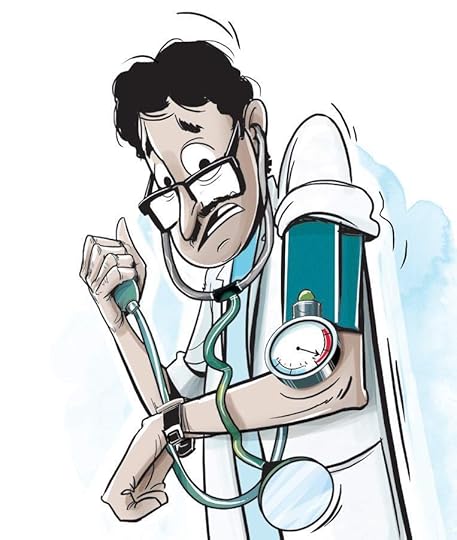
Setting up a private practice is a case of hit or miss. You may or may not click with the patients, who can be rather fickle when it comes to following up with you, and loath to pay consultation charges. It takes years in any case to make a name for yourself.
In the hospital set up, you need to tow the line of the management, and accept a pre-set salary or 'cuts' from the consultation charges, which are rather like seedless peanuts!
So you are left with a job that you do not enjoy, and that does not provide you with anything substantial to set up home and raise a family. This is especially true if you happen to live in a high-cost city, such as Bengaluru.
The effect of all this? Disillusionment; burn out and drop outs. I have seen many doctor friends leaving the country in search of a better deal. Some have altogether dropped out of the profession and started business ventures. Some have contemplated suicide.
Yes, we have encountered and are still putting up with many 'KPMEA's in our lives as doctors.
Basically, the recent fiasco from the state government has highlighted three issues, as I see it:the general public wants first-class service at the lowest cost, preferably free of costthe doctors want a fulfilling career that provides them with financial security on par with other vocationsthe government (in the ideal world) would want a seamless primary and secondary care service that satisfies both stakeholders; public and healthcare professionalsAt the moment, none of these three issues are being addressed, even with the implementation of the KPMEA. How can one put a cap on healthcare services without capping other non-essential services that are being allowed to jack up prices wantonly. Go, for example, to a multiplex and see for yourself how much you have to shell out for the ticket and food.
What is the solution? There is none that is perfect, but we are looking at a scenario where the medical service is free to the public, but at the same time, the hospital and the healthcare providers are compensated suitably.
The state owned NHS of UK (even though many in that country find faults with it) comes to mind as a service that achieves just this. Free healthcare funded for by the taxpayers' money that is deducted at source.
On the other side of the pond, the US healthcare is largely privately provided, with insurance system covering the cost for the patient.
We need to look at these and other models to decide the best suitable healthcare delivery system that can be adapted to our conditions. Mindlessly capping fees and charges in an increasingly capitalized and corporatized society is not going to cut it.
Somehow, I cannot see the present government of Karnataka making any thoughtful, pragmatic changes in this regard, given the fact that it has its eyes set on the upcoming state elections.
So, dreadful, populist measures such as Indira Canteen and KPME Act will continue to be inflicted on the unsuspecting populace, as this government attempts to revive the dynasty that has clearly done its time.
Governments will come and go. The doctor in Karnataka will continue to suffer.
Image source: http://images.newindianexpress.com/up...
Published on November 25, 2017 07:14
Who wants to be a doctor?
Karnataka has got to be the worst place for a medical practitioner. And the KPME Act has nothing to do with this.
The KPMEA is only the latest in a long list of insults that have been meted out towards the 'noble profession.'
As though the tough-as-nails medical course were not enough, each of us doctors has been through hell and high water to try and eke out a living.
Find that hard to believe? I don't blame you; especially in these times when news channels proclaim striking doctors to be 'Yama's agents.'
Consider the odds stacked against us: difficult course that one manages to scrape through; even more difficult PG entrance exams; bottle-neck in the form of dime-a-dozen medical UG colleges, but not enough PG seats; capitation fees to get into UG and PG courses; sleepless on-call nights; dog's work in the wards/OTs/OPDs; climbing mountains to establish oneself as a sought-out doctor, assaults on doctors, non-recognition of foreign PG degrees, etc.
During all this, family/social life goes for a toss and you can pretty much forget about hobbies, alternative interests, and life outside the daily medical grind. By the time you get round to your hobbies and interests again, you are well past your prime.
One can't even change jobs like those in technical professions can. Once a doctor, always a doctor. You got to struggle on endlessly, even if you earn a pittance in comparison to the IT-BT lot who easily earn twice or thrice as much. It is a strange dilemma that a doctors finds him/herself in: deficiency in the midst of plenty. Indian economy is up and running, but the healthcare professional is strangely finds him/herself left out of the Indian success story.

Setting up a private practice is a case of hit or miss. You may or may not click with the patients, who can be rather fickle minded, and loathe to shell out money. It takes years in any case to make a name for yourself. In the hospital set up, you need to tow the line of the management, and accept a pre-set salary or 'cuts' from the consultation charges, which are rather like seedless peanuts!
So you are left with a job that you do not enjoy, and that does not provide you with anything substantial to set up home and raise a family. This is especially true if you happen to live in a high-cost city, such as Bengaluru.
The effect of all this? Disillusionment; burn out and drop outs. I have seen many doctor friends leaving the country in search of a better deal. Some have altogether dropped out of the profession and started business ventures. Some have committed suicide.
Yes, we have encountered and are still putting up with many 'KPMEA's in our lives as doctors.
Basically, the recent fiasco from the state government has highlighted three issues, as I see it:the general public wants first-class service at the lowest cost, preferably free of costthe doctors want a fulfilling career that provides them with financial security on par with other vocationsthe government (in the ideal world) would want a seamless primary and secondary care service that satisfies both stakeholders; public and healthcare professionalsAt the moment, none of these three issues are being addressed, even with the implementation of the KPMEA. How can one put a cap on healthcare services without capping other non-essential services that are being allowed to jack up prices wantonly. Go, for example, to a multiplex and see for yourself how much you have to shell out for the ticket and food.
What is the solution? There is none that is perfect, but we are looking at a scenario where the medical service is free to the public, but at the same time, the hospital and the healthcare providers are compensated suitably.
The state owned NHS of UK (even though many in that country find faults with it) comes to mind as a service that achieves just this. Free healthcare funded for by the taxpayers' money that is deducted at source.
On the other side of the pond, the US healthcare is largely privately provided, with insurance system covering the cost for the patient.
We need to look at these and other models to decide the best suitable healthcare delivery system that can be adapted to our conditions. Mindlessly capping fees and charges in an increasingly capitalized and corporatized society is not going to cut it.
Somehow, I cannot see the present government of Karnataka making any thoughtful, pragmatic changes in this regard, given the fact that it has its eyes set on the upcoming state elections.
So, dreadful, populist measures such as Indira Canteen and KPME Act will continue to be inflicted on the unsuspecting populace, as this government attempts to revive the dynasty that has clearly done its time.
Governments will come and go. The doctor in Karnataka will continue to suffer.
Image source: http://images.newindianexpress.com/up...
Published on November 25, 2017 07:14


